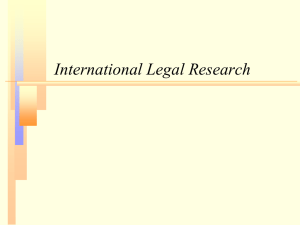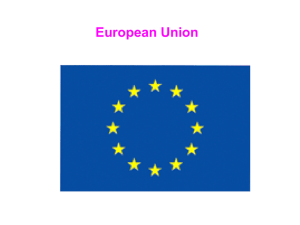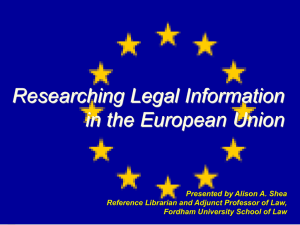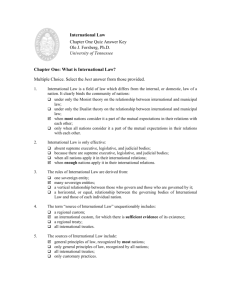Researching EU Information ()
advertisement
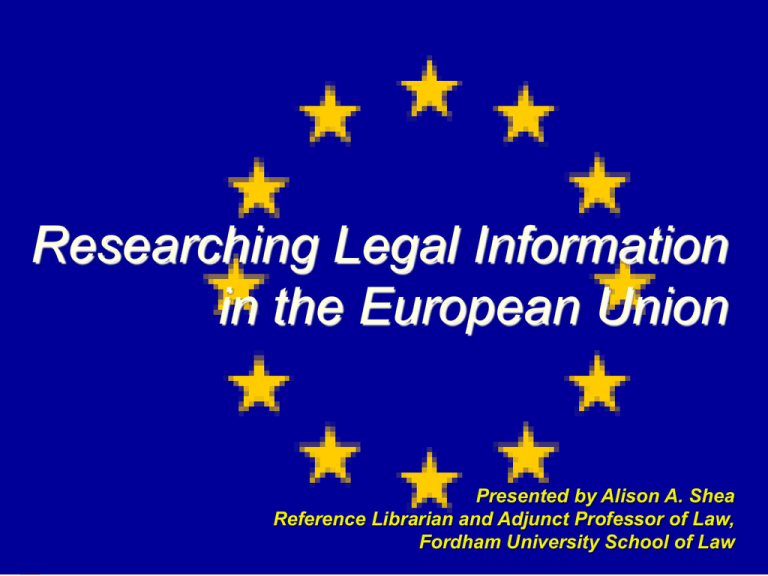
Researching Legal Information in the European Union Presented by Alison A. Shea Reference Librarian and Adjunct Professor of Law, Fordham University School of Law Why the EU matters to you If you want to practice transnational law, the EU regulates a number of areas that are often involved in transnational practice, most especially competition law EU is now a leading voice in international affairs and monetary policy • Euro crisis/austerity measures EU court cases have far reaching policy effects • Google’s “Right to be Forgotten” case What is the European Union? A “unique economic and political partnership between 28 democratic European countries” Primarily created to avoid any future inter-Europe wars and to encourage more cross-border cooperation in commercial matters (“internal market”) What isn’t the European Union? Council of Europe European Court of Human Rights • Consult the “Do not get confused” chart to see differences – http://www.coe.int/en/web/about-us/do-not-getconfused Establishing Treaties Treaty of Paris (1951) (ECSC) EC Treaty (1957) (originally The Treaty of Rome; renamed the Treaty Establishing the European Community or The EC Treaty in 1993) Merger Treaty of 1965 Single European Act (1987) Maastricht Treaty (1993) (also called the Treaty on European Union or TEU) Treaty of Lisbon (2007) • Information on the succession of treaties available here: http://europa.eu/abc/treaties/index_en.htm Current Treaties in Force Consolidated Treaty on European Union (TEU) Consolidated Treaty on the Functioning of the European Union (TFEU) Charter of Fundamental Rights of the EU • All available here: http://eurlex.europa.eu/collection/eulaw/treaties.html Treaty of Lisbon Started off as the “EU Constitution” but most member states freaked out about that, so now it’s just another Treaty that amends, rather than replaces, existing treaties Came into force December 1, 2009 Amended treaty available at Europa: http://europa.eu/lisbon_treaty/index_en.ht m • Be sure to consult the consolidated treaty, which incorporates all changes to existing treaties Treaty of Lisbon What’s the big deal? • • • • Greater democracy and transparency Simplification and more efficient working Single voice on the international stage Promoting rights and values Key issues to watch will be what the EU does with increased power in foreign policy and justice, freedom and security Treaty of Lisbon Completely renumbers existing Treaty articles • When citing articles of the Treaty as it stood before 1 May 1999, “Article 85 EEC” • References to the Treaty as it stands from 1999 – 2009 should read ‘Article 81 TEC’ • Reference to the Treaty after 2009 should read ‘Article 101 TFEU’ – If you need to clarify the old number, use “Article 101 TFEU (ex Article 81 TEC)” “Table of Equivalencies” for old and new article numbers available at: • 2012 OJ(C 326) 363 Major Institutions of the EU Legislative Body • European Parliament Judicial body • European Court of Justice Administrative body • European Commission (EC) Hypo Does this agreement fall foul of EU law? Two leading low-cost carriers, Scaryair (based in Dublin) and Skeezyjet (based in the UK) currently have an estimated 35% of the market share of the total UK and Ireland domestic routes. Scaryair approach SkeezyJet about the possibility of coming to some sort of agreement whereby Scaryair would agree to drop some of its UK domestic routes that SkeezyJet also operates in return for SkeezyJet agreeing not to start a new service from UK-Ireland. Hierarchy of EU Law Treaties (Primary Legislation) Regulations, directives, decisions (Secondary Legislation) General Principles of Law Case Law Treaties between Member States Where to start? Europa – EU’s main info portal http://www.europa.eu Provides a gateway for locating EU information • Use this page to access various EU legal information portals • Search by Policy Area if you know what subject matter you’re looking for • Do a site-wide search if you’re not sure where to begin – Press releases are required to contain links to relevant docs LOCATING INFORMATION ON A TOPIC - Europa If you are starting from scratch, try browsing EU by Topic for relevant links Search function is not very good, but remember that press releases are now required to link to primary source documents referred to, If you have a citation, so they may be useful you can locate it through the links under EU Law LOCATING INFORMATION ON A TOPIC - Europa Links to relevant other sites, i.e. DG Comp Links to relevant LOCATING INFORMATION ON A TOPIC - European Commission: http://ec.europa.eu/policies/index_en. htm LOCATING INFORMATION ON A TOPIC - Commission Example #1 I’m looking for legislation that deals with Bathing Water quality. I don’t have a cite, and don’t know how exactly it’s regulated or by whom. • When you are looking for general policy, try starting with Europa • Remember that press releases are now required to contain links to the relevant documents, so try searching the site • Also, you can browse the “Policy Areas” to try and locate the relevant DG for that topic From the main Europa page, you can either search the site for relevant hits, or browse through the policy areas to locate the relevant DG for this area If you can only find press releases, at the bottom of the press release are links to the documents mentioned—which show that the relevant DG is Environment— and also the citations to the relevant legislation This is the relevant DG for bathing water quality—you can now browse for links to relevant legislation and other policy document Where do we find EU legal information? EUR-Lex Best way to access authentic versions of EU treaties, legislation, cases and international agreements • http://eur-lex.europa.eu • NOTE: be aware that “treaties” are EU founding/accession treaties (i.e. the “constitution” of this IGO) between members of the EU, and “international agreements” are agreements (i.e. treaties) that have been entered into with other countries on behalf of the EU as an entity To browse different types of documents, click here Primary legislation: Treaties Source of primary legislation Current treaties in force: • Consolidated Treaty on European Union (TEU) • Consolidated Treaty on the Functioning of the European Union (TFEU) • Charter of Fundamental Rights of the EU All treaties can be found here: • http://eur-lex.europa.eu/collection/eulaw/treaties.html A good place to find the pinpoint citations to relevant sections of a treaty is to use the Europa Policy Areas page (discussed above in slides 13-15) Full text of treaties can be found on EUR-Lex BB translation: 2012 O.J. (C 326) 88 Official Journal The OJ has been published since 1967 • two main series: – L (Legislation) – C (Communication = Information and Notices). • published daily in 22 of the 23 official languages. Available on Eur-Lex • You can now get PDFs back to 1973 in English, 1968 for original EC languages • “Certified” PDF version available—on the way to becoming “authentic” versions • E-only since July 1, 2013 – click on “Official Journal” icon to get the e-journal with “legal value” Example #2 Can I get a full text version of the following cite: 1990 O.J. (L 180) 26 • Since you already have the OJ cite, use Eur-Lex to search by OJ reference and simply fill in the relevant information: – Year: 1990 – OJ Series: L – OJ Number: 180 – Page: 26 Now locate the page number in your cite PDF of official version in all official languages – you want “EN” Secondary Legislation Regulations • binding legal force throughout every Member State Directives • lay down certain end results that must be achieved in every Member State • national authorities have to adapt their laws to meet these goals, but are free to decide how to do so. • may concern one or more Member States, or all of them. Decisions • Binding in entirety but only to those Member States or entities to whom addressed Recommendations/Opinions • No binding force How to Find EU Legislation (without a cite) • Summaries of EU Legislation – Allows you to browse through topical areas • http://eur-lex.europa.eu/browse/summaries.html • Europa – Through EU Policy Areas (discussed in slides 13-15) • Through the relevant Commission group’s website – List of relevant DG sites: • http://ec.europa.eu/about/ds_en.htm SUMMARIES OF EU LEGISLATION SUMMARIES OF EU LEGISLATION SUMMARIES OF EU LEGISLATION The new interface via Eur-Lex can be kind of confusing – once you choose your area of interest in the previous page, you are now brought to a Eur-Lex page that looks like you’re selecting documents but in reality you’re choosing a “guide” SUMMARIES OF EU LEGISLATION Again, this page closely resembles the page for a primary source document, but be aware it is SECONDARY – helps you determine what the relevant legislation is for a particular topic How to Find EU Legislation (witha cite) • Eur-Lex – http://eur-lex.europa.eu/ – Simply go to the main page box entitled “Find Results by Document Number” and fill in the required fields • Lexis & Westlaw also have legislation RETRIEVING LEGISLATION ON EUR-LEX Easiest way to retrieve legislation by citation—by document number. You will still retrieve to the OJ version RETRIEVING LEGISLATION ON EUR-LEX Unfortunately you often get lots of irrelevant results, even when searching by citation – the first two links are not at all relevant to our query – the final result is the one we want RETRIEVING LEGISLATION Select PDF for official full text version from OJ Select “Linked documents” for annotations like you would see in West o Lexis’ annotated US code—if this were a directive, always sele this feature to locate national implementin legislation “LINKED DOCUMENTS” Affected by case: Case law that litigates this particular piece of legislation – like Notes of Decisions for USCA CELEX numbers “6” stands for Sector 6, which is case law Example #3 Locate Directive 2011/7/EU. What is it about? • Since you have the document number already, simply go to Eur-Lex and search by document number Is it published in an official source? • The Official Journal is the official source for all EU legislation Click here to find national implementing measures Official citation info Select the version in the language you want Official full text version—to create cite, note data above: year 2011, journal series: L, journal volume 48, page 1. “LINKED DOCUMENTS” Click here to find out info on domestic legislation that has been passed to implement this directive For countries which are not English-speaking, click on the hyperlink anyways and it will give you the name of the legislation in that language – follow up using N-lex (see below) or other foreign law finding aid Tracking EU legislation To track pending/proposed legislation (similar to Congress.gov in the US), use these sources which have the same information, just organized by two different groups • EUR-Lex – http://eur-lex.europa.eu/collection/eu-law/preacts.html • Legislative Observatory – http://www.europarl.europa.eu/oeil/index.jsp?la European Commission – COM docs The EC is the only body who can propose legislation, and they do this in the form of a COM document There is usually a lengthy period of consultation and amendment before COM Documents become public, and only the final version is published. Consequently, they are cited in the format: • COM (year) running number, final Where to find EC documents Registry of Commission Documents Legislative Observatory Eur-Lex • All of the above sources allow for retrieval by citation If you do not know what you are looking for but prefer to browse, try the Commission page for the policy area http://ec.europa.eu/about/ds_en.htm Tracking History on COM DocsLegislative through PRE-LEX Legislative Observatory Use “Search by Reference” if you already have a cite Finding ECJ cases Court of Justice of the European Union Three main competencies: • reviews the legality of the acts of the institutions of the European Union, • ensures that the Member States comply with obligations under the Treaties, and • interprets European Union law at the request of the national courts and tribunals Consists of three courts: • the Court of Justice • the General Court (created in 1988) • the Civil Service Tribunal (created in 2004). Where to find EU cases & decisions Eur-Lex • http://eur-lex.europa.eu/RECH_jurisprudence.do Curia • http://curia.europa.eu/\ European Court Reports (E.C.R.) [official] • Part I contains the ECJ cases and AdvocateGeneral Opinions • Part II contains the CFI/GC cases. • Traditionally only print…. – HOWEVER….ceased printing in 2012. Read my blog post for more info: https://fcilsis.wordpress.com/2014/07/07/changes -in-ecj-case-publishing-and-citation-methods/ FINDING CASE ON EUR-LEX FINDING CASE ON EUR-LEX This is the official reporter citation---2008 ECR I-9275 FINDING CASE ON CURIA FINDING CASE ON CURIA This is the official reporter citation---2008 ECR I-9275 Dockets There are NO procedural documents available for EU case law; if you want them, you must apply to the Registry and even then they might not release them, especially if you are not an EU citizen Advocate General opinions The advocates general assist the Court in its task. • They deliver, in open court and with complete impartiality and independence, opinions on the cases brought before the Court. • duties should not be confused with those of a prosecutor or similar official--that is the role of the Commission, as guardian of the Community’s interests Use Curia to search for AG opinions SEARCHING ADVOCATEGENERAL OPINIONS Be sure you are aware of which result is the one that you want—for example, the OJ cite “looks” official but is only a summary of the judgment, not the actual full text. Also, be aware of the difference between the judgment and the Advocate Generals’ Opinion (which precedes the actual judgment) Example #5 “Would you please send me the ECJ judgment in Kanal 5 (2008). Thanks.” • When looking for a case, try starting with Curia, the European Courts’ official website. You can also search case law using Eur-Lex Is there an official version available? • Eur-Lex provides ECR citations, but there is no electronic version of the ECR version as of yet Curia’s simple search box on the front page makes it easy to locate cases using basic data—in this instance, we know the name of the party (Kanal 5—but only input “Kanal” incase the decision spells out the number), the court (Court of Justice), and the date (2008, although with the distinctive party name we probably don’t even need the date) This is the official reporter citation---2008 ECR I-9275 Be sure you are aware of which result is the one that you want, especially the difference between the judgment and the Advocate Generals’ Opinion (which precedes the actual judgment) Unofficial (but reliable) full text of the judgment – to check and see if ECR is available, try checking Eur-lex – however, no guarantee that either Curia or Eur-lex will have PDF Example #6 Could you give me a list of all EU cases that deal with free movement of goods that have been decided in the past year? • You can easily search cases by topic using Curia To access advanced search features, click on the tiny graphic with the magnifying glass Limit your dates and the subject-matter by clicking on the little icon next to the search box – I haven’t been able to get it to open on Firefox, so try a different browser if you’re having trouble Special note about competition cases Competition law cases start as commission investigations, which result in a decision • Similar to US FTC decision The DG Comp has a great database for searching commission decisions taken in the areas of: • • • • Antitrust Cartels Mergers State Aid Many decisions also available through Eur-Lex but much better interface and organization on DG Comp page • http://ec.europa.eu/competition SEARCHING COMPETITION CASES ON DG COMP PAGE If you don’t already have a cite, use Advanced search to limit to relevant topic/party SEARCHING COMPETITION CASES SEARCHING COMPETITION CASES Commonly cited as: Case COMP/39.596 Are we finished? Primary Article 101 of the TFEU Secondary Regulation 1/2003 Case law European Court cases Commission decisions Preparatory DOMESTIC LAW! Researching domestic law Each Member State will have its own domestic laws on any topic and will need to be referenced together with EU law • Use traditional foreign legal research methods to locate EU laws • If you are referencing a Directive, use the National Implementing legislation link within the bibliographic record • Try using N-lex, especially if you are unfamiliar with the Member State’s language Researching domestic law There is an excellent resource called EuroVoc which is a multilingual, multidisciplinary thesaurus covering the activities of the EU, the European Parliament in particular. • Allows users to search domestic law throughout all EU countries without having to know the native language • contains terms in 23 EU languages (Bulgarian, Croatian, Czech, Danish, Dutch, English, Estonian, Finnish, French, German, Greek, Hungarian, Italian, Latvian, Lithuanian, Maltese, Polish, Portuguese, Romanian, Slovak, Slovenian, Spanish and Swedish), plus Croatian and Serbian.
